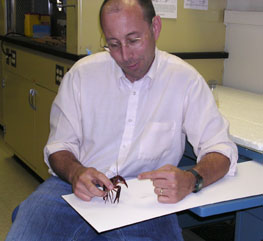|
Supplementary
Materials
Readings from the primary literature will be assigned on occasion.
These articles will be posted on Blackboard for you to download
and print.
Course
Description
Advanced
study of how animals use remarkable sensory abilities to communicate,
navigate, and detect prey, predators and mates. We will focus on
extreme and unusual sensory systems such as echolocation, electroreception,
and magnetoreception, as well as vision, smell, touch, proprioception,
muscle tenson and hearing.
Course
Objectives
By the end of this course, you should be able to:
1. Have a conceptual understanding of animals possessing different
sensory abilities and limitations that are shaped by their evolutionary
history as assessed by examination.
2. Understand the how physical stimuli travel and how they are transduced
by sensory cells into chemical responses in animals as assessed
by examination.
3. To appreciate how sensory stimuli and simplified and analyzed
by sensory systems as assessed by examination
4. Develop a basic knowledge of the sensory processing as assessed
by examination.
5. Be able to solve problems and critically analyze research papers
in the field of Neuroscience.
6. Be able to discuss and develop new ideas and suggest future research
directions in the field of Neuroscience.
The goals
of this course are that the learning outcomes will be met by the
students
Course Work/Grading
Overall
The course will be a mix of lecture and student-led discussion.
Readings will be taken from the text and from the primary research
literature. The main output of the course will be a term paper on
your chosen subject in animal senses. Wewill provide greater detail
on the term paper, but basically you will read recent primary research
papers on one subject and will explain their meaning and how they
relate to each other. Graduate students will be required to read
more papers than undergrads. We will help you to decide on a term
paper topic, your topic proposal is due in Week 4, and the titles
of all of your research papers are due in Week 5 (see schedule).
Term paper:
Topic- 5
pts
References- 20 pts
Summaries (Abstract 25points, article of <500 words layman article
25 points) - 50 pts
Outline- 50 pts
First draft- 20 pts
Final draft- 100 pts
Exams: 3
exams = 100 points each
Class
participation (questions in class, paper discussions, online discussions)-
15 pts
Late assignments will lose 10% of total point possible for every
day late. Lateness will be calculated based on the time and date
listed on Blackboard, and you assignment will be counted when it
is submitted on BB/Turnitin or by email, depending on which method
is requested by the instructor.
Undergraduate
students will be provided with a Midterm Evaluation (by the midterm
date) of course performance based on criteria in syllabus
Final
grades will be based on % of total points earned and will be assigned
as follows:
Undergraduates:
A = 90 - 100 %
B = 80 - 89.99 %
C = 70 - 79.99 %
D = 60 - 69.99 %
E = less than 60 %
Graduates:
Topic- 5 pts
References- 20 pts
Two Summaries (Abstract 12.5 points for each, two article of <500
words layman each article 12.5 points each) - 50 pts
Outline- 50 pts
First draft- 20 pts
Final draft- 100 pts
Exams: 3
exams = 100 points each
Quizzes:
3 each 25 pts = 75 pts
A = 92 -
100 %
B = 82 - 91.99 %
C = 72 - 81.99 %
D = 62 - 71.99 %
E = less than 62 %
Writing assignments for course:
Abstract: Write an abstract on a topic of interest related to current
literature on the topic of choice
Short newspaper type report:Write a <500 word article for the
public, i.e. newspaper or magazine
Review article/term paper: There will be one formal manuscript write-up
due this semester. The manuscript is intended to mimic the review
manuscript writing and submission processes required for scientific
publication, and it will utilize results from reviewing scientific
literature. The manuscript must be written independently (no group
submissions). The draft and final submission dates are listed above
in class schedule. The writing format described by the Journal of
Comparative Biochemistry and Physiology - Part A: Molecular &
Integrative Physiology will be used or Annual Reviews in Physiology.
As an example, go to the journal's web page and look up information
for authors at: http://www.elsevier.com/wps/find/journaldescription.cws_home/525464/description
The "guide to authors" provided by the journal provides
the formatting guidelines that must be followed for this assignment.
Additional information for this assignment will be made available
through the course website.
All
exams are required of all students. If you are unable to take an
examination as scheduled, it is your responsibility to contact the
instructors before the exam. Unexcused absences from an exam will
result in a score of zero for that test. Homework and problem sets
that are turned in late will be marked down a point each day they
are late, and they must be turned in before those that were turned
in on time are returned.
Attendance
Required.
Format
In this course, you will learn the fundamentals sensory systems
by lectures, problem sets, independent/group study, and in-class
exercises. Please note that you are responsible for all the material
in the assigned chapters, including figures, summaries, and "boxes,"
regardless of whether it is covered in lectures. Thus, you will
be responsible for covering some material from the text or readings
on your own.
Blackboard/Class
Communications
Course announcements, assignments, lecture outlines and additional
materials will be posted online using Blackboard. Exams and homework
dates will remain fixed. Updates to this syllabus (regarding topics
and reading) will be posted; please check periodically. You will
also receive important course announcements via your UK e-mail account.
If you do not use your UK e-mail account, you need to activate it.
It is strongly recommended that you check your e-mail regularly.
The instructors may send messages-sometimes with attachments-to
the class using this medium. You should also feel free to e-mail
the instructors if you have any questions or problems. Feel free
to call the instructors as well, if you prefer a more personal communication.
We are also available in our officies. If you would like to meet
with us at another time, please don't hesitate to e-mail or to call,
and we can schedule a time to meet.
Honesty
and Civility
You must abide by UK's Code of Conduct which prohibits:
http://www.uky.edu/StudentAffairs/Code/index.html
1.
Academic dishonesty and impropriety, including plagiarism and academic
cheating.
2. Interfering or attempting to interfere with or disrupting the
conduct of classes or any other normal or regular activities of
the University.
We take plagiarism and other forms of cheating very seriously. If
you have any questions as to whether something is plagiarism, please
ask me, or, if that's not possible, assume that it is and don't
do it!
Disabilities
(Room
2, Alumni Gym, 257-2754 )
Any student who needs accommodation because of a disability should
contact Dr. Cooper privately to discuss the specific situation as
soon as possible. The Office of Disability Resources and Services.
They can coordinate reasonable accommodations for students with
documented disabilities.
There
is an online form that faculty are asked fill out and submit...
http://www.uky.edu/StudentAffairs/DisabilityResourceCenter/testAcc.html
So, let Dr. Cooper know if he needs to fill out the form.
|

